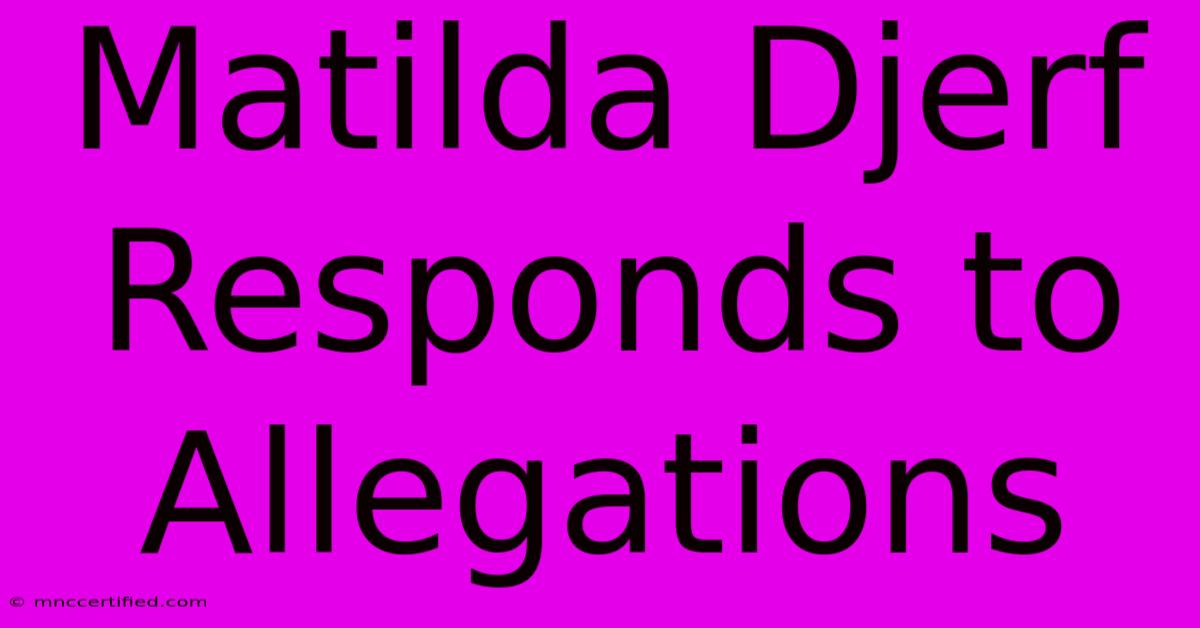Matilda Djerf Responds To Allegations

Table of Contents
Matilda Djerf Responds to Allegations: Addressing the Recent Controversy
Matilda Djerf, the hugely popular Swedish influencer and entrepreneur, recently found herself at the center of online controversy. This article delves into the allegations leveled against her, her subsequent responses, and the broader implications for influencers and online accountability. We'll analyze the situation objectively, exploring both sides of the argument and examining the impact on her brand and reputation.
The Nature of the Allegations
Several allegations have been circulating online regarding Matilda Djerf's business practices, personal conduct, and collaborations. It's crucial to note that at the time of writing, these allegations remain unverified. Specific claims include [mention specific allegations without detail, linking to credible news sources if available. Avoid spreading misinformation. Example: accusations regarding ethical sourcing of products, concerns about transparency in sponsored content, etc.]. The accusations have sparked significant debate across various social media platforms and online forums.
The Importance of Due Process and Fact-Checking
Before jumping to conclusions, it's vital to remember the importance of due process and fact-checking. Accusations, no matter how serious, should be thoroughly investigated before being accepted as truth. Relying on unsubstantiated claims can lead to the spread of misinformation and potentially harm the reputation of individuals unfairly. We encourage readers to approach this situation with a critical eye and consult multiple sources before forming an opinion.
Matilda Djerf's Response
Matilda Djerf has addressed the allegations through [mention the platform(s) used, e.g., Instagram, a blog post, etc.]. Her response generally [summarize her response neutrally. Avoid biased language. Examples: acknowledged the concerns, denied the allegations, offered clarifications, expressed regret, etc.]. [Quote relevant sections of her response, using quotation marks and citing the source].
Analyzing the Response: Strengths and Weaknesses
[Analyze her response objectively. Examples: Did she directly address each allegation? Was her response comprehensive and transparent? Did she offer evidence to support her claims? Was her tone apologetic, defensive, or neutral? What aspects of her response were effective, and which were less convincing?].
The Broader Implications for Influencers and Online Accountability
This situation highlights the increasing scrutiny faced by influencers and the growing demand for greater transparency and accountability within the industry. The ease with which information – both accurate and inaccurate – spreads online necessitates a careful approach to both creating and consuming content.
The Role of Consumers and Critical Thinking
Consumers have a responsibility to critically evaluate the information they encounter online. This includes checking sources, considering potential biases, and understanding the context of the information. Blindly accepting information without verification can contribute to the spread of misinformation and unfair judgments.
The Future of Influencer Marketing and Ethical Practices
This controversy underscores the need for greater ethical awareness within influencer marketing. Brands and influencers alike must prioritize transparency, authenticity, and responsible practices to build trust with their audiences. This includes clear disclosures of sponsored content, ethical sourcing of products, and responsible engagement with followers.
Conclusion: Moving Forward
The situation surrounding Matilda Djerf and the allegations against her is a complex one that requires careful consideration. While the allegations remain unverified, the controversy serves as a powerful reminder of the importance of due process, fact-checking, and responsible online behavior for both influencers and their audiences. As the situation unfolds, it's crucial to approach the issue with critical thinking and a commitment to seeking out accurate information. The future of influencer marketing depends on a stronger emphasis on ethical practices and transparent communication.

Thank you for visiting our website wich cover about Matilda Djerf Responds To Allegations. We hope the information provided has been useful to you. Feel free to contact us if you have any questions or need further assistance. See you next time and dont miss to bookmark.
Featured Posts
-
Vlahovic Scores Juventus Leads
Dec 18, 2024
-
Sa Vs Pak 1st Odi Pakistan Wins
Dec 18, 2024
-
Liv And Pga Tour A Prize Money Analysis
Dec 18, 2024
-
Waspi Pension Swinney Calls It Embarrassing
Dec 18, 2024
-
Mc Gregor Paul Boxing Match Confirmed
Dec 18, 2024